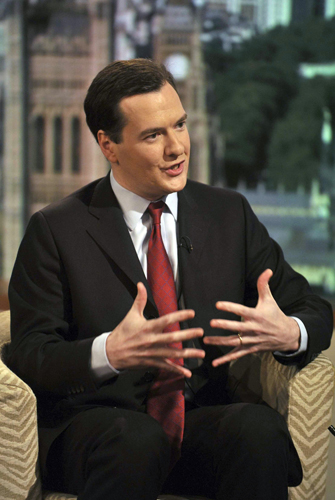World Business
British finance minister hints at 'tough but fair' emergency budget
(Xinhua)
Updated: 2010-06-21 15:45
 |
Large Medium Small |
|
 |
|
Britain's Finance Minister George Osborne speaks to BBC journalist Andrew Marr during a televised interview in London June 20, 2010. The biggest threat to Britain's economy is its huge budget deficit, and an emergency budget on Tuesday will save the country from the fate of debt-stricken Greece, Osborne said on Sunday.Xinhua/Agencies] |
LONDON - British new coalition government's chancellor of the exchequer, Finance Minister George Osborne, said on Sunday that his emergency budget to be unveiled this coming Tuesday will be "tough but fair".
Osborne's first budget as chancellor is widely expected to see large and painful cuts to public spending as he attempts to tackle the record public spending deficit he inherited from the outgoing Labor government in the wake of the financial crisis.
Osborne said the deficit needed tackling urgently, to avoid losing the confidence of the international money markets.
Osborne said in a BBC TV interview on Sunday, "We sit here as the country in Europe with the largest budget deficit of any major economy at a time when markets and investors and businesses look around the world at countries that can't control their debts.
"We have got to deal with that. But what I am determined to do is make sure the measures are tough but they are also fair and that we are all in this together."
There is strong speculation among political commentators that Osborne will increase Value Added Tax, a sales tax which currently stands at 17.5 percent, to 20 percent.
He is also expected to take action over the benefits budget, which costs 180 billion pounds a year ($295 billio), possibly by freezing increases and withdrawing benefits from moderately well-off families. Public sector pensions have also been highlighted as an area where Osborne might seek substantial cuts.
In a keynote speech to the leaders of the British finance sector on Wednesday in London, Osborne outlined his major task and the principal aim of the coalition government during its five-year term of office.
Osborne said, "Our country has the highest budget deficit of any country in Europe, with the exception of Ireland."
He added, "Dealing with this inheritance from its predecessor is the single greatest economic challenge the new government faces. "
The public spending deficit, the amount the government needs to borrow beyond its revenue income in order to carry out its services, stands at record level of 155 billion pounds.
The national debt has reached 903 billion pounds, which is 62.2 percent of GDP, the highest since records began in 1993, underlining the task faced by the coalition government in its bid to cut the debt burden.
This comes on top of 6.25 billion pounds of cuts in government spending in this financial year 2010-11, which were announced just over a fortnight ago.
Osborne became chancellor of the exchequer when the coalition government formed on May 11, five days after the inconclusive general election of May 6 failed to produce a party with a majority in the House of Commons able to form a government.
Osborne comes from the center-right Conservative party, the larger party in the coalition. Conservatives traditionally prefer smaller government and lower taxes, while the smaller party in the coalition, the center-left Liberal Democrats, feel less strongly about cutting taxes.
In a show of solidarity, Prime Minister David Cameron, a Conservative, Osborne, Deputy Prime Minister Nick Clegg (the Liberal Democrat leader), and Alexander, a Liberal Democrat, jointly signed off the budget on Friday.
Osborne will reveal the details of the budget on Tuesday in the House of Commons.



